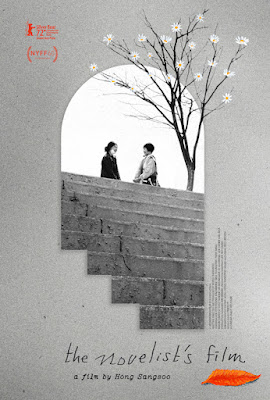Novelists have a spotty track record directing films based on their own work. Michael Crichton and Clive Barker did pretty well for themselves, but Stephen King and Norman Mailer disappointed their admirers (but delighted fans of high camp). It is hard to say how Kim Jun-hee might fare, because her filmmaking goals and intentions are rather vague. That makes her a fitting protagonist for Hong Sang-soo’s latest lowkey binge-drinking gab-film, The Novelist’s Film, which opens today in New York.
Kim ventured out of Seoul to visit her old friend Se-won, who now owns the local independent bookstore. Their reunion catches Se-won by surprise. In fact, it is somewhat awkward, but rather mildly so, by Hong’s standard. Afterward, she visits the local scenic tower, where she coincidentally runs into Hyo-jin, a director who once attempted to adapt one of her novels, but the project fell-through. Again, it is awkward, but not outrageously so.
Strolling outside in the gardens, they just so happen to run into Kil-soo, a thesp Hyo-jin knows, who has put her career on hold, retreating to the peaceful calm of the provinces. Kim did not know her before, but they get on like a house on fire—so much so, Kil-soo agrees to appear in the yet to be conceived film the novelist suddenly decides to make.
In Hong’s previous films, coincidences were clever inventions that created their own meaning. Unfortunately, the coincidences in Novelist’s Film simply come across as humdrum occurrences necessitated by the relatively small cast of characters. The wit is largely gone, but the neuroses remain.
Aside from when she gives the Hyo-jin what-for, Kim is a frustratingly reserved and difficult-to-read character. Admittedly, Kim Min-hee plays Kil-soo with an appealingly innocent charm, but that only goes so far. Kwon Haw-hyo does little to differentiate Hyojin from at least half of dozen other self-absorbed filmmaker characters we have seen in Hong’s prior films. Ki Joo-bong expresses some flashes of the old Hong eccentricity as poet Man-soo, who coincidentally happens to be an old acquaintance of Kim’s, but is it nowhere near sufficient to overcome the film’s listlessness.
It is hard to say whether Hong hoped to mystify or de-mystify the filmmaking process with Novelist’s Film. It hardly matters. For anyone who has seen a fair amount of his prolific output over the last twenty years, this film will feel like a copy of a copy. It is an extremely minor film. Not recommended, The Novelist’s Film opens today (10/28) in New York.

